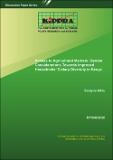| dc.description.abstract | Achieving food and nutritional security by all people at all times is a key development
goal at the global, regional and national levels. Gender mainstreaming in
food and nutritional policies, programmes and projects is increasingly being
recognized as important to the realization of SDG 21. In addition, access to wellfunctioning
markets is likely to improve farmers profitability and their access
to diverse nutritious foods. This paper avails the evidence of gendered access
to organized agricultural markets on household dietary diversity scores in
Kenya using nationwide survey data. Using an inverse probability weighted
treatment-effect estimator, we evaluate whether improving women’s and men’s
access to well-functioning agricultural markets facilitates diet diversity among
households. The analysis shows that while improving both women and men’s
agricultural commercialization through organized marketing systems improves
the dietary diversity outcomes of households, the effect on women is double that
of men. However, greater effects are achieved when both the female and male
in the same household have access to well-functioning agricultural markets.
Further, addressing human and socio-economic needs of households are also
important in enhancing households’ dietary diversity quality. | en |

